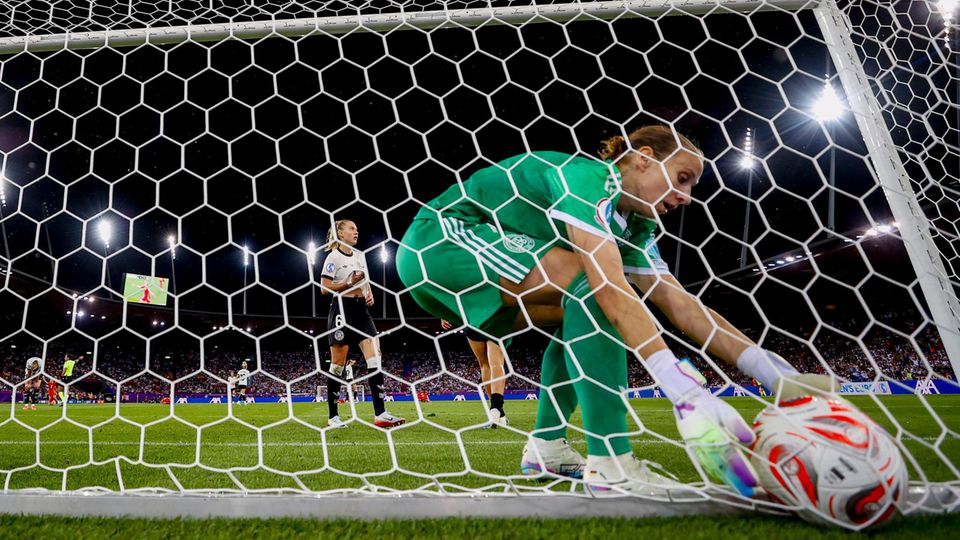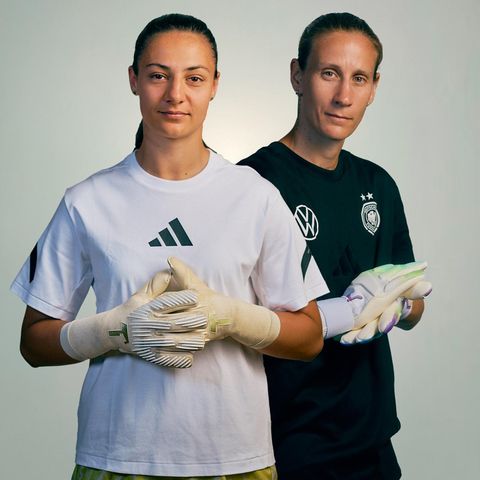Opinion
FC Ann-Katrin Berger failed
The DFB team against Spain shows that it is not enough to rely on the heroic deeds of a goalkeeper. The German team lacks a coherent game idea.
Ann-Katrin Berger was a heroine until the 113rd minute of this European semi-final against Spain. Every ball that joined her gate parented. By jumping, by defense, standing or lying down. And often enough in pain, because an opponent had hit her in her ribs in the early second half.
But then came the 113th minute, which was to be an ominous for Berger and for the entire German national team: Falpass Sydney Lohmann, the ball ends up with Spain. Aitana Bonmatí starts on the right wing, moves into the German penalty area – and does not play a cross pass, but aims at the first post, the so -called short corner. However, Berger had speculated on a pass and releases the corner. Shot bonmatí, 1-0 Spain.
A deficit that the Germans no longer catch up in the few minutes that remain them. The DFB team leaves the tournament. Ann-Katrin Berger is still a heroine, but a tragic one.
Berger’s honesty is impressive
Immediately after the final whistle, coaches tried to protect Berger. Because it had admitted: “The ball should have been mine. I take my blame.”
This honesty, these hardness in the judgment against itself, is impressive. Ann-Katrin Berger, 34, will go out of this European Championship as a big player. She was the best goalkeeper of the tournament so far; In the quarter -finals against France, she held a deflected ball in the backward fall – a spectacular action that the British “Guardian” described as a “of the best parades of all time at an EM”. In the penalty shootout, she fended off two balls and turned one herself. Without Berger, the Germans would never have reached the European Championship semi-final.
Any hymn of praise that was tuned to her in the days after: absolutely justified. Any encouragement, every attempt by the teammates to relieve Berger after the Spain game: appropriate and deserved.
But what does that say about the German team when perception and evaluation of a complete EM appearance narrowed to a single player? Germany was the FC Ann-Katrin Berger in the past few weeks. A one-Woman show, the stage belonged to her alone.
Where was a second or third -shaped player? Whose star went up at the tournament in Switzerland? Which German player is looking at the experts from now on? Who is at the top of the lists of the scouts?
No one. And that’s a problem.
National coach Christian Wück tried to present the European Championship out as an unfortunate coincidence. It was “bitter” that one was “excreted in the end because of such a stroke of genius”, he said and meant the shot from Bonmatí.
But these words only obscure a look at the situation of the German national women. Failure in Switzerland was by no means due to a Lucky punch of the Spaniards. There are structural reasons.
Anyone who had watched the German footballers to be in defensive battles against France and Spain, how they grabed one ball after another, only to lose him again after a long liberation – they had trouble recognizing the team that the national coach had shaped in the months before the tournament.
The national coach lacked belief in his own plan
Wück, 52, has been in office for a year. From the beginning, he had declared a departure from the safety football of his predecessor Horst Hrubesch. For months he had his rejuvenated team practiced a brave, offensive approach. With success: Under Wück, the DFB selection developed into one of the most attacking teams in Europe. In the last six games before the tournament, the team shot an average of more than four goals per game. A strong value.
All the more astonishing that there was little to see from the European Championship. Already with the victories in the group phase, force was missing in the German attack game. The game against Sweden then showed how risky Wück’s approach is if it is not consistently implemented. The German team defended high, but inattentive and without protection. Few passes were enough to cover them. The DFB team lost 1: 4. And what apparently believes in his plan.
The DFB team made a stranger against Spain
Before the quarter -finals, Wück had emphasized that a defensive orientation was not to fit his team. But then he offered five defenders against France. The early red card against Kathrin Hendrich did not alternatively make the wall tactic. The German players had little different than to annoy the French, to involve them in duels and to disturb their rhythm with fouls. The Germans succeeded brilliantly, they fought their way into the penalty shootout.
Against Spain, however, the DFB team did not return to the original game idea, but simply continued the defense battle. From the first minute. Wück’s team didn’t even try to playfully compete with the Spaniards. She made a stranger and left the ball to the opponent. As if her plan alone was based on wanting to save himself again in the penalty shootout. As if a game in the co-phase of an European Championship could only be decided by the reflexes by goalkeeper Berger.

For months, Wück had geared everything towards the attack in order to be defended in the decisive games. You can consider this pragmatic given the many failures in the squad. Or for despondent.
Wück’s team may have won many sympathy with their fight. But the price for this is high. The national coach sacrificed his game idea. After the defeat, Wück said that the European Championship had “initiated a development”. However, the question is: in which direction? Wück said that they wanted to be “not a blueprint of Spain”, but develop their own identity. But what it should look like, what Wück and his teams want to stand for is more unclear than ever after this tournament.
The German team says goodbye to this EM with a big puzzle.
Source: Stern
I am Pierce Boyd, a driven and ambitious professional working in the news industry. I have been writing for 24 Hours Worlds for over five years, specializing in sports section coverage. During my tenure at the publication, I have built an impressive portfolio of articles that has earned me a reputation as an experienced journalist and content creator.




